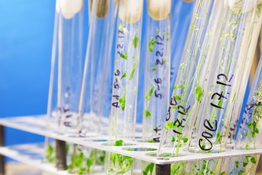
Researchers Engineer Potyvirus Resistance in Arabidopsis Using CRISPR/Cas9
September 14, 2016| |
 In previous studies, members of the eukaryotic translation initiation factor (eIF) gene family, including eIF(iso)4E from Arabidopsis, have been identified as recessive resistance alleles against potyviruses in a range of hosts. However, the introgression of these alleles into major crop species is limited.
In previous studies, members of the eukaryotic translation initiation factor (eIF) gene family, including eIF(iso)4E from Arabidopsis, have been identified as recessive resistance alleles against potyviruses in a range of hosts. However, the introgression of these alleles into major crop species is limited.
The team of Douglas E. Pyott from the University of Edinburgh in the UK used CRISPR/Cas9 technology to introduce sequence-specific deleterious point mutations at the eIF(iso)4E locus in Arabidopsis thaliana to successfully engineer a complete resistance to Turnip mosaic virus (TuMV), a major pathogen in vegetable crops. By segregating the induced mutation from the CRISPR/Cas9 transgene, this study forms a framework for the production of heritable mutations in the transgene-free T2 generation in the self-pollinating species.
Analysis of the four independent T3 lines developed from the transformation revealed no differences between them and the wild-type plants, suggesting that mutations in eIF(iso)4E do not affect plant vigor. The CRISPR/Cas9 technology provides a new approach for the modifying crops with Potyvirus resistance alleles.
For more information on the study, read the article in Molecular Plant Pathology.
| |
Biotech Updates is a weekly newsletter of ISAAA, a not-for-profit organization. It is distributed for free to over 22,000 subscribers worldwide to inform them about the key developments in biosciences, especially in biotechnology. Your support will help us in our mission to feed the world with knowledge. You can help by donating as little as $10.
-
See more articles:
-
News from Around the World
- FAO Projects Increase in Maize, Wheat, and Rice Grain Output
- Kanayo Nwanze Receives Inaugural Africa Food Prize
- Uganda's Minister of S&T Lauds Researchers on Biotech Innovations
- Kenya's National Biosafety Authority Gives GM Cotton Partial Nod
- Scientists Develop New Approach to Genetic Modification of Maize and Other Grains
- US EPA Approves New Agrisure® Trait Stack from Syngenta
- New Wheat Varieties with Dwarf Genes Show Promise
- South Asia Biotechnology Centre Invites Public Comments to Support GE Mustard
- Study Highlights Impact of Plant Breeding in the EU
-
Research Highlights
- Fern Protein Expression in Cotton Prevents Whitefly Attack
- Researchers Search for Drought-Related Transcription Factors in Common Bean
-
Beyond Crop Biotech
- Trehalase Genes Regulate Expression of the Chitin Synthesis in Red Flour Beetle
-
Resources
- Biotech Crop Annual Updates and Biotech Trait Annual Updates
-
Plant
- Geminivirus-Mediated Genome Editing in Potato Using Sequence-Specific Nucleases
- Researchers Engineer Potyvirus Resistance in Arabidopsis Using CRISPR/Cas9
-
Read the latest: - Biotech Updates (February 18, 2026)
- Gene Editing Supplement (January 28, 2026)
- Gene Drive Supplement (February 22, 2023)
-
Subscribe to BU: - Share
- Tweet
